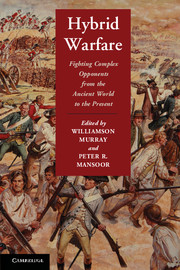Book contents
- Frontmatter
- Contents
- Figures
- Contributors
- Acknowledgment
- 1 Introduction
- 2 Conquering Germania
- 3 Keeping the Irish Down and the Spanish Out
- 4 The American Revolution
- 5 That Accursed Spanish War
- 6 The Union's Counterguerrilla War, 1861–1865
- 7 Fighting “this nation of liars to the very end”
- 8 Small Wars and Great Games
- 9 An Unexpected Encounter with Hybrid Warfare
- 10 Hybrid War in Vietnam
- 11 Conclusion
- Index
- References
7 - Fighting “this nation of liars to the very end”
The German Army in the Franco-Prussian War, 1870–18711
Published online by Cambridge University Press: 05 August 2012
- Frontmatter
- Contents
- Figures
- Contributors
- Acknowledgment
- 1 Introduction
- 2 Conquering Germania
- 3 Keeping the Irish Down and the Spanish Out
- 4 The American Revolution
- 5 That Accursed Spanish War
- 6 The Union's Counterguerrilla War, 1861–1865
- 7 Fighting “this nation of liars to the very end”
- 8 Small Wars and Great Games
- 9 An Unexpected Encounter with Hybrid Warfare
- 10 Hybrid War in Vietnam
- 11 Conclusion
- Index
- References
Summary
Who in 1870 ever dreamed of bread coupons, meat coupons, potato coupons, fat shortages, and other provisioning difficulties? Who could have presumed that the English would try to cordon off and starve millions of people? And who at the time had any notion that a future war would be decided in factories, would amount to a technical wrestling match? From a war of armies arose a war of peoples in the fullest sense…the entire people, including women and children, would be subjected to the austerities of war, and the entire people would have to share in the work of meeting the gigantic requirements of the war effort.
“Unpolitische Zeitläufe,” November 1916Military organizations engage in hybrid warfare when, having expected and prepared to wage a particular form of war, they find themselves compelled simultaneously to wage another type. One may also understand the concept as a historical fault line, along which shifting social, economic, cultural, and technological forces grate and combine in new and unanticipated ways, leading to the rise of new forms of warfare. Such concepts describe the Franco-Prussian War of 1870–1871 particularly well, but they also apply in varying degrees to almost every major war fought since the dawn of recorded history.
The war that culminated the long process of German unification incorporated institutions and ideas deeply infused with eighteenth- and early-nineteenth-century understandings of limited force and its utility; it also displayed important early indications of the factors that would prove decisive after 1914 – mass mobilization and industrial potential, force application across a spectrum of intensity, and a stronger emphasis on absolute aims and outcomes in the face of popular enthusiasms. And like most hybrid wars throughout history, the Franco-Prussian War proved conceptually frustrating to a generation of officers compelled to make sense of its intellectual inheritance.
Keywords
- Type
- Chapter
- Information
- Hybrid WarfareFighting Complex Opponents from the Ancient World to the Present, pp. 171 - 198Publisher: Cambridge University PressPrint publication year: 2012
References
- 1
- Cited by

